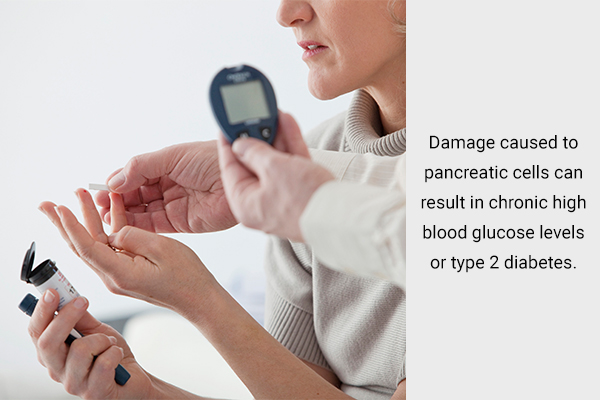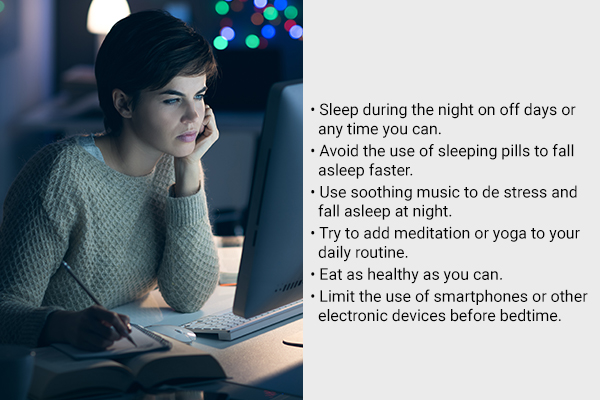In this article:
The most common work schedule all over the world is during the daylight hours: 7 am to 6 pm. Any work schedule outside of these hours (such as during the night) is called shift work.

Shift work can lead to a syndrome called “shift work disorder,” which is characterized by a disturbance in the body’s natural circadian rhythms. It causes insomnia, restlessness, and other symptoms.
People who work late nights or very early mornings are particularly at risk of this condition. They include call center employees and hospital staff such as doctors, nurses, and emergency staff.
Shift Work and Its Effects on Long-Term Health
Shift work causes a change in the body’s natural sleep cycle that messes with hormone balance. It also gives you less time for exercise or self-care in general, especially in rotating shifts. (1) Thus, it can affect your biological clock and lifestyle.
Here are some common problems caused by shift work.
1. Causes sleep problems
Shift workers tend to get lesser sleep than those on a day schedule. This may be due to the lowered quality of sleep in morning hours, rotating shifts that change their sleep schedules, or the inability to get a complete 6–8 hours of sleep.
Recently, the World Health Organization has classified shift work as “probably carcinogenic” – this highlights the possible risks associated with lowered sleep. It interferes with the body’s natural clock, which regulates many activities such as hormone production, metabolism, and digestion. (2)
2. Increases risk of type 2 diabetes

Recent studies have shown that disturbed circadian rhythms and insufficient sleep can cause damage to and even death of the beta cells of the pancreas. These pancreatic cells are responsible for producing insulin and regulating blood sugar levels.
Damage caused to these cells can result in chronic high blood glucose levels or type 2 diabetes.
According to a Chinese study, shift work can put you at a 37% increased risk of developing diabetes due to disrupted circadian rhythms. (3)(4)
3. Leads to obesity
Insufficient sleep or sleeping “against” your body’s natural clock may also lead to weight gain or obesity. (3)(5)
A 2015 study showed that frequent night shifts are co-related with increased body mass index and waist circumference. It is estimated that night shifts can increase your chances of obesity by 29%.
This correlation may be due to the disturbance in hormone regulation, late-night eating, or decreased time to cook healthy meals at home. (6)
4. Compromises heart health
Night shifts can make you more prone to developing hypertension. Chronic hypertension is bad for your heart health.
Shift work has also been associated with heart diseases. Sleeping too little or disturbed sleep can put you at risk of several cardiovascular issues such as coronary heart disease and stroke, in addition to high blood pressure.
A recent study published in a leading cardiology journal stated that working night shifts can be a factor behind 7% of heart attacks in Canada between the years 2018 and 2019. (7)(8)
Lifestyle changes, insufficient sleep, and psychological stress can all be reasons behind increased rates of heart issues in shift workers. (9)
5. Contributes to depression
Night shift workers may have a 33% increased risk of developing depression. Working against the body’s natural biological clock – which responds to light and dark atmospheres –may be a reason behind this.
It can cause restlessness and insomnia when you try to sleep during the day along with disrupting hormone cycles. (10)(11)
6. Causes gastrointestinal problems

Shift workers also have a higher rate of gastrointestinal issues such as heartburn, acidity, diarrhea, indigestion, and stomach ache. (12)(13) There has also been an increased incidence of ulcers in night-shift workers.
This can be attributed to late-night meals, which disrupt several body functions as all your organ systems follow the body’s biological clock. Stress and fatigue also play a role in the disruption of digestive functions as they can lead to inflammatory bowel syndrome (IBS).
Limited food options available during late nights, mostly limited to junk food, may also be a factor behind such problems. (14)
How Shift Work Impacts Your Sleep and Causes Health Problems
Most people who follow a set schedule in their everyday routine can adapt to night shifts or morning shifts. It only becomes a problem when you need to work rotating shifts.
Your body follows a circadian rhythm, which is thrown off track when you interrupt your regular sleep schedule. Disrupted sleep can cause hormonal imbalances, decreased concentration levels, and other issues.
The body uses your daily patterns and light exposure such as sleep schedule, light/ dark exposure, and meal times to set its natural clock. For example, body temperature tends to rise at specific points during the day (just before you wake up).
Working shifts can disrupt this routine and your hormone production. This may cause feelings of fatigue or tiredness. Some people’s bodies can adapt to the new changes in a couple of days, whereas others take longer.
Shift Work and Concerns on Pregnancy
The Centers for Disease Control and Prevention (CDC) state that working during the night or working longer hours can lead to hormonal changes that may disturb the menstrual cycle.
It is also related to miscarriages and preterm births in some pregnant women. However, more studies are needed to confirm the role shift work plays in causing miscarriages. (15)
What Shift Workers Must Do
To deal with the problems brought on by working on shifts, follow these measures:

- If you work at night, ensure you get exposure to bright light (artificial box lights) since you do not get enough sunlight. Then, keep your bedroom dark and quiet when you sleep in the morning.
- Use sleep masks to enhance the quality of your sleep.
- Create a peaceful resting environment at home. Use shades to darken your bedroom during the morning hours for better sleep.
- Sleep during the night on off days or any time you can.
- Avoid the use of sleeping pills to fall asleep faster.
- Play soothing music to de-stress and fall asleep at night.
- Add meditation or yoga to your daily routine.
- Eat as healthy as you can.
- Limit the use of smartphones or other electronic devices before bedtime.
- Most people find it difficult to work night shifts consistently. Experts recommend following a proper daily schedule and not changing it even on off days in order not to disrupt your body’s circadian rhythm. (16)
- Take breaks every couple of hours during shift work.
Points for Employers
If you employ people on shift work, try the following things to ensure their well-being:
- Make sure your employees are not overburdened at home and get a restful sleep after their shift.
- Educate your staff on how to better protect their body’s natural clocks and promote a healthy lifestyle when doing shift work.
- You and your employees should try to consume nutritious food, and make sure it is available during your working hours.
- Since shift workers are at higher risk for some illnesses, ascertain they get routine health checkups.
- Organize social events every once in a while, to boost morale and lower stress levels.
Final Word
Shift work is essential in today’s world, and many industries are relying on night-shift workers. Shift work can be eradicated completely, but understanding the risks associated with it may make you better prepared to avoid them.
- Was this article helpful?
- YES, THANKS!NOT REALLY


